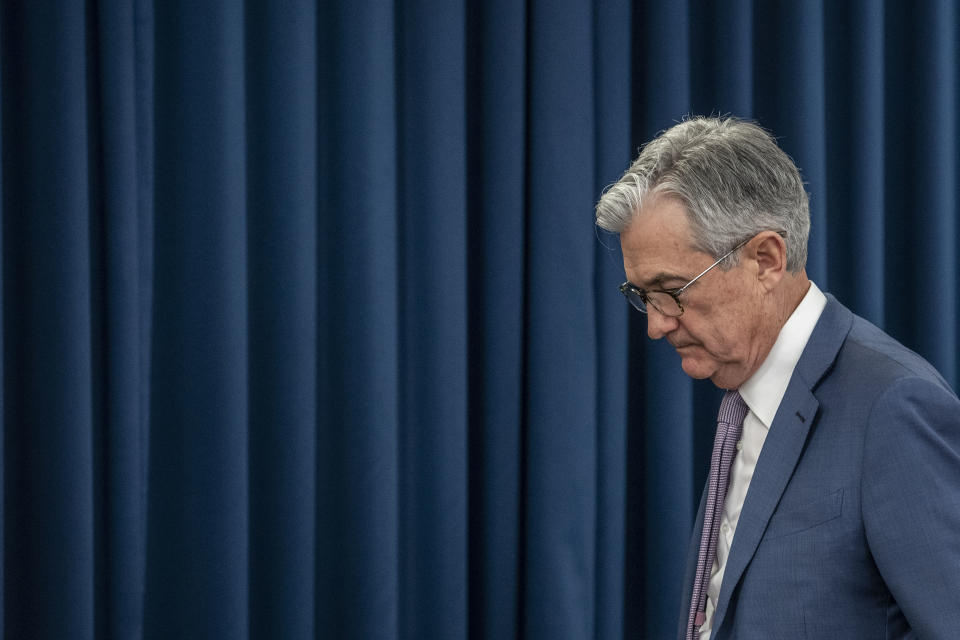Buffett: Fed 'did the right thing' by unfreezing corporate debt markets
Warren Buffett on Saturday applauded the Federal Reserve for backstopping the corporate debt markets, adding that the Fed’s actions in response to the COVID-19 crisis helped provide liquidity to companies that desperately needed it.
“The Federal Reserve did the right thing and they did it very promptly, which they should have, and I salute them for it,” Buffett said.
In Berkshire Hathaway’s annual shareholder meeting held virtually and exclusively hosted online by Yahoo Finance, Buffett compared Fed Chairman Jerome Powell to the late Paul Volcker, who had helmed the Fed through rampant inflation during the 1980s.
“Jay Powell, in my view, belongs up there on that pedestal with [Volcker] because they acted in the middle of March, probably somewhat instructed by what they’d seen in 2008 and ’09,” Buffett said.

Buffett said the Fed’s actions in late March prevented a full freeze in corporate credit markets in which “perfectly decent companies” were unable to raise money as business closures evaporated their margins.
On March 23, the Fed announced it was creating several liquidity facilities that would take on commercial paper and medium-term investment grade debt. By entering the debt market as its own counterparty (through separate vehicles with equity investment from the U.S. Treasury), the central bank hoped to not only backstop markets but give private players the confidence to provide their own liquidity.
Buffett says the measures worked, claiming that companies needing funding have had no problem finding funding since the Fed’s actions.
Thank you letters
“Every one of those people that issued bonds in late March and April ought to send a thank you letter to the Fed,” Buffett said. “Because it would not have happened if they hadn’t operated with really unprecedented speed and determination.”
In early April, the Fed expanded the scope of its corporate debt facilities to cover “fallen angel” companies that had recently slipped from investment grade to junk debt. It also said its facilities would take on some high-yield ETFs.
Although the Fed has its commercial paper facility up and running, the Fed actually has yet to take a single dollar through its so-called Primary Market Corporate Credit and Secondary Market Corporate Credit facilities. The New York Fed, which will operate the programs, said it will begin corporate debt ETF purchases in “early May” followed by direct bond purchases “soon thereafter.”
But Buffett said the Fed’s messaging already helped companies find funding through other sources, which has relieved Berkshire Hathaway of its historic role as a lender of support. During the 2008 and 2009 financial crisis, Buffett loaned money to massive companies like Mars and Dow Chemical for blockbuster mergers.
Buffett said he had received calls from companies looking for support but found none of the opportunities attractive. After the Fed acted, the calls stopped.
“A number of them were able to get money in the public market, frankly at terms we wouldn’t have given to them,” Buffett said.
Amid the Fed’s alphabet soup of liquidity facilities and uncapped quantitative easing, the central bank’s balance sheet has ballooned to $6.7 trillion, a data point that Buffett says he is watching closely.
“We don’t know what the consequences of that [will be], and nobody does exactly,” Buffett said. “And we don’t know what the consequences of what they undoubtedly will have to do.”
Buffett applauded the Fed and other global central banks for the “whatever it takes” attitude in approaching the current crisis.
Brian Cheung is a reporter covering the Fed, economics, and banking for Yahoo Finance. You can follow him on Twitter @bcheungz.
El-Erian: Fed is tangled in a 'spaghetti bowl' of credit risk
Fed commits to near-zero rates as US economy sees 'sharp declines'
Cafe chain Cosi sues SBA for excluding bankrupt companies from emergency loans
A glossary of the Federal Reserve's full arsenal of 'bazookas'
Read the latest financial and business news from Yahoo Finance
Follow Yahoo Finance on Twitter, Facebook, Instagram, Flipboard, SmartNews, LinkedIn, YouTube, and reddit.

 money
money 
